MGT 433-01 Expatriate Management Practices: Case Study & Analysis
VerifiedAdded on 2021/05/12
|31
|7497
|134
Report
AI Summary
This report provides a comprehensive examination of expatriate management practices, focusing on the case of Johnson & Johnson. It delves into the critical aspects of expatriate success, including the selection process, pre-departure training, compensation strategies, the role of the expatriate's spouse, mentoring and coaching, and strategies for repatriate retention. The report begins with an abstract summarizing the importance of expatriate management and its impact on business expansion. A literature review explores different staffing approaches, selection criteria based on personality and cultural intelligence, and the significance of cross-cultural training. The report also includes an analysis of the ethnocentric approach used by Johnson & Johnson. Interpretations of findings, implications, and recommendations are provided to emphasize the value expatriates bring to business operations and overall success. The conclusion summarizes the key findings and offers recommendations for improving expatriate management.
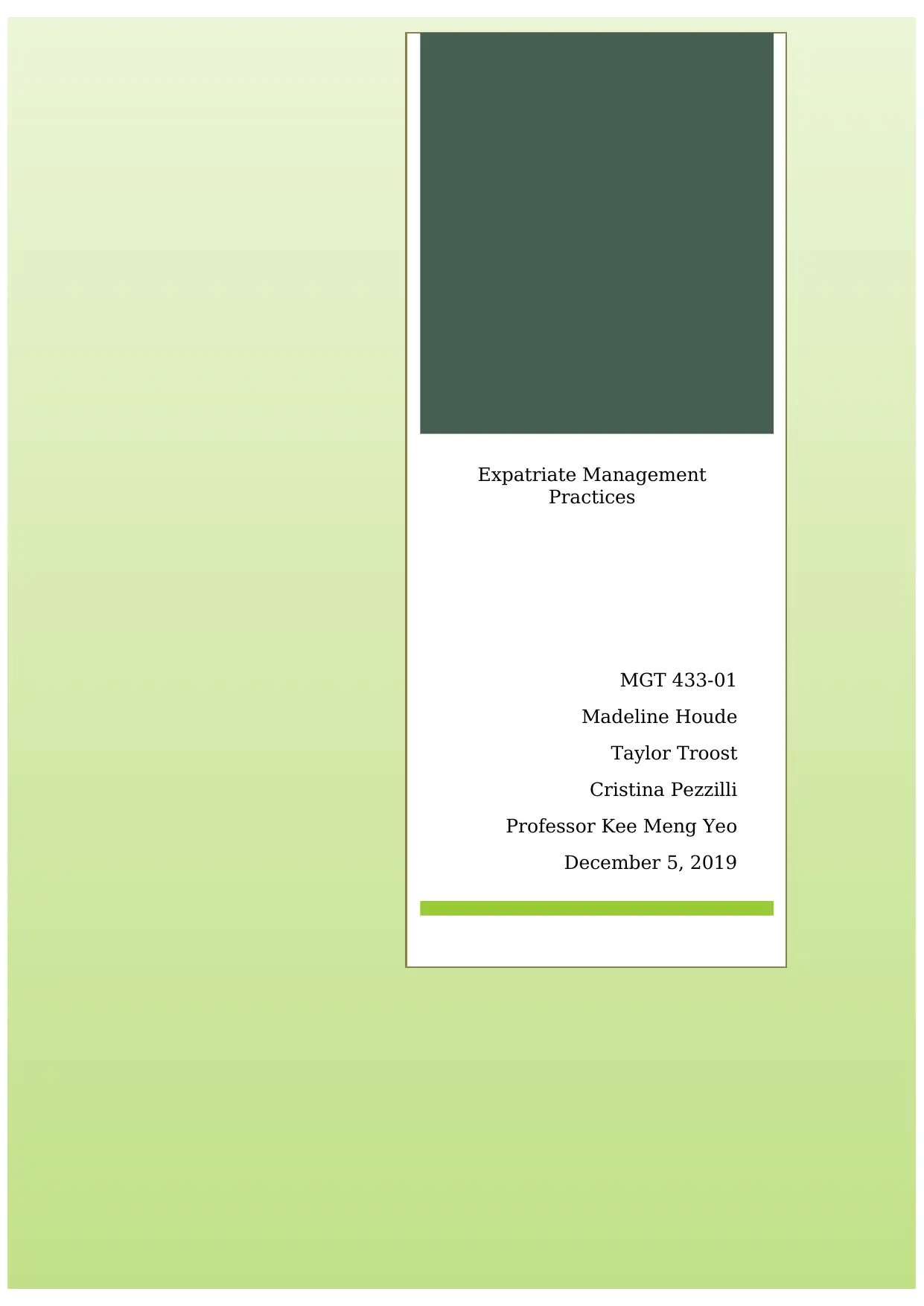
Expatriate Management
Practices
cri
MGT 433-01
Madeline Houde
Taylor Troost
Cristina Pezzilli
Professor Kee Meng Yeo
December 5, 2019
Practices
cri
MGT 433-01
Madeline Houde
Taylor Troost
Cristina Pezzilli
Professor Kee Meng Yeo
December 5, 2019
Paraphrase This Document
Need a fresh take? Get an instant paraphrase of this document with our AI Paraphraser
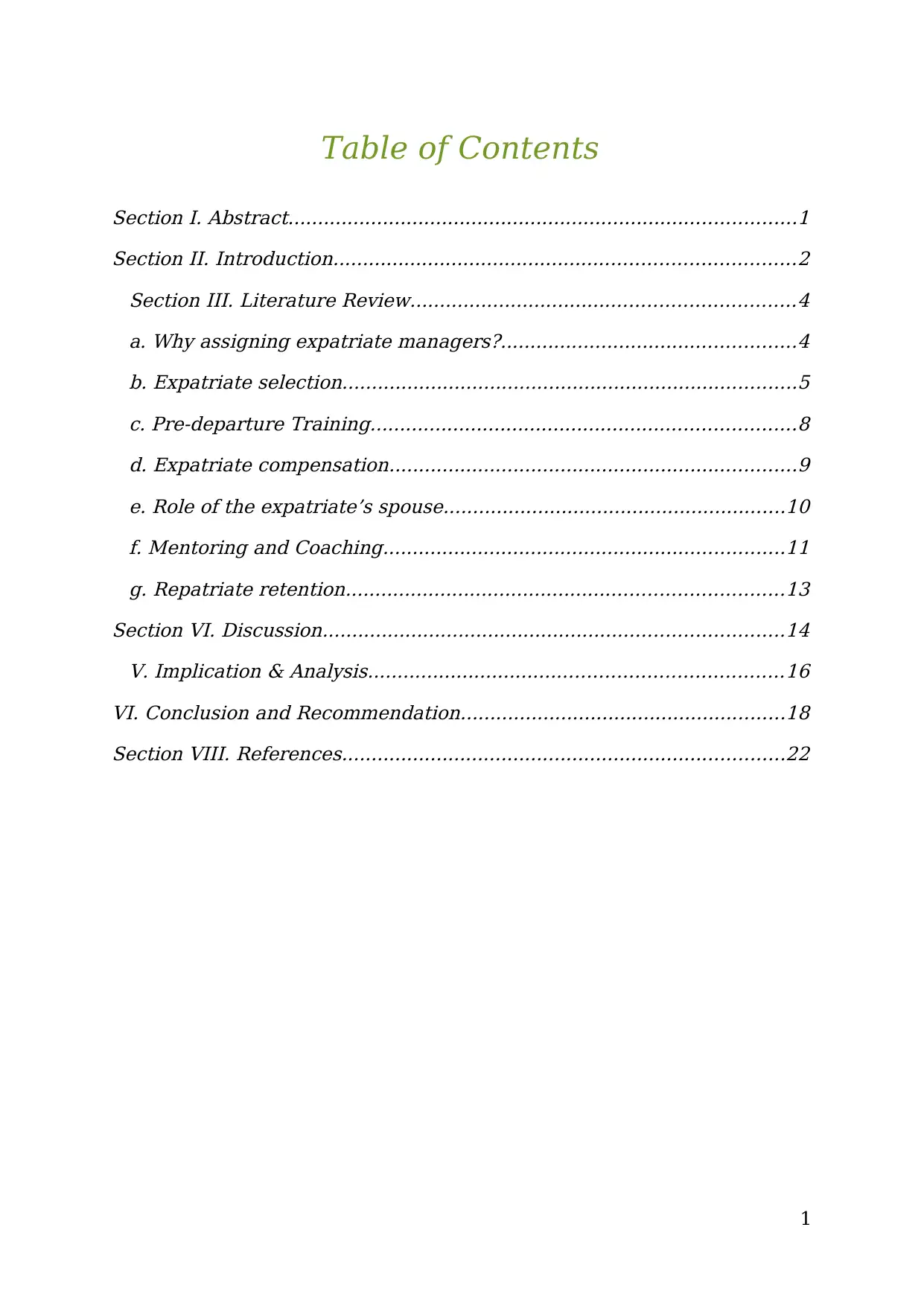
Table of Contents
Section I. Abstract......................................................................................1
Section II. Introduction..............................................................................2
Section III. Literature Review.................................................................4
a. Why assigning expatriate managers?..................................................4
b. Expatriate selection.............................................................................5
c. Pre-departure Training........................................................................8
d. Expatriate compensation.....................................................................9
e. Role of the expatriate’s spouse..........................................................10
f. Mentoring and Coaching....................................................................11
g. Repatriate retention..........................................................................13
Section VI. Discussion..............................................................................14
V. Implication & Analysis......................................................................16
VI. Conclusion and Recommendation.......................................................18
Section VIII. References...........................................................................22
1
Section I. Abstract......................................................................................1
Section II. Introduction..............................................................................2
Section III. Literature Review.................................................................4
a. Why assigning expatriate managers?..................................................4
b. Expatriate selection.............................................................................5
c. Pre-departure Training........................................................................8
d. Expatriate compensation.....................................................................9
e. Role of the expatriate’s spouse..........................................................10
f. Mentoring and Coaching....................................................................11
g. Repatriate retention..........................................................................13
Section VI. Discussion..............................................................................14
V. Implication & Analysis......................................................................16
VI. Conclusion and Recommendation.......................................................18
Section VIII. References...........................................................................22
1
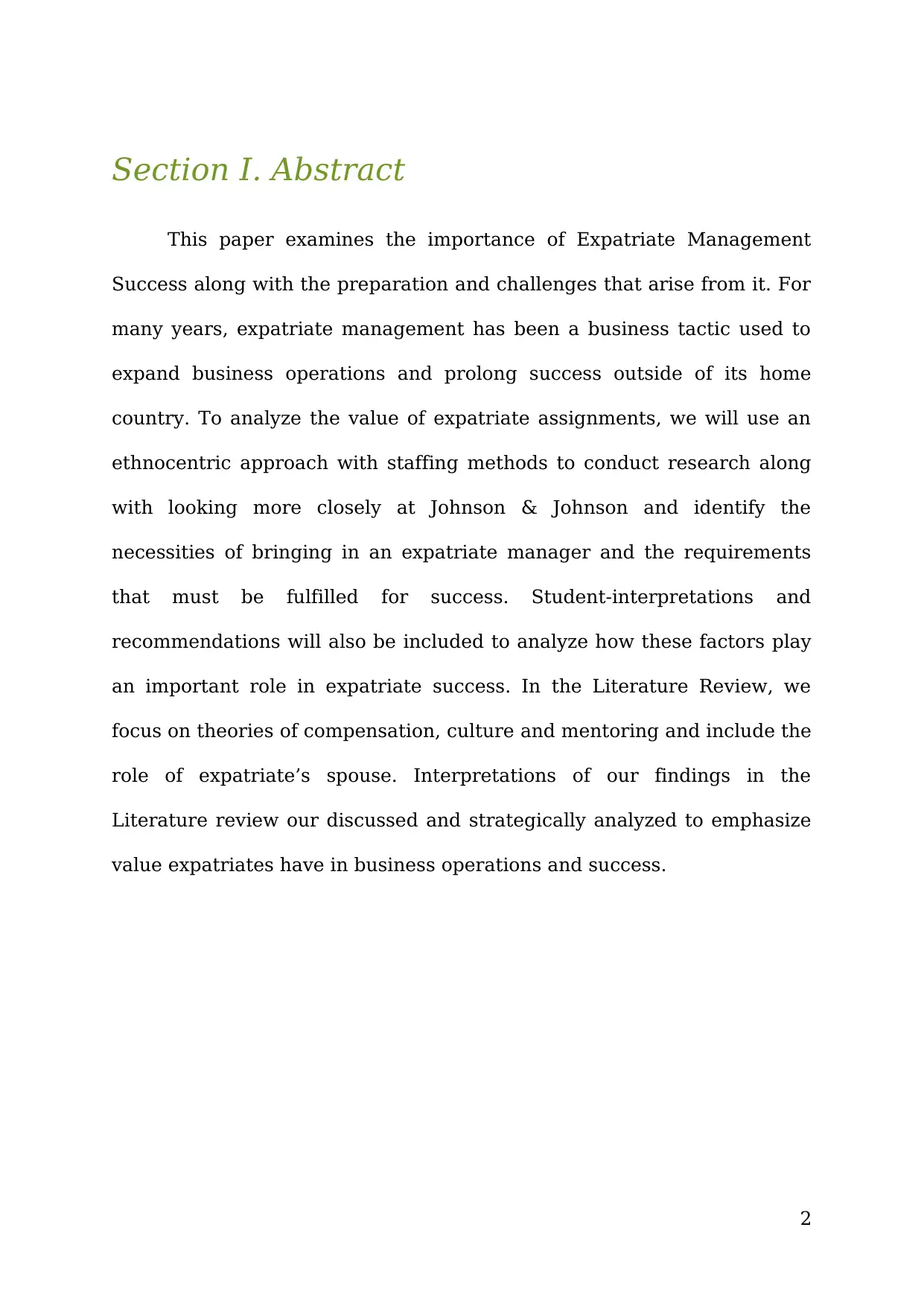
Section I. Abstract
This paper examines the importance of Expatriate Management
Success along with the preparation and challenges that arise from it. For
many years, expatriate management has been a business tactic used to
expand business operations and prolong success outside of its home
country. To analyze the value of expatriate assignments, we will use an
ethnocentric approach with staffing methods to conduct research along
with looking more closely at Johnson & Johnson and identify the
necessities of bringing in an expatriate manager and the requirements
that must be fulfilled for success. Student-interpretations and
recommendations will also be included to analyze how these factors play
an important role in expatriate success. In the Literature Review, we
focus on theories of compensation, culture and mentoring and include the
role of expatriate’s spouse. Interpretations of our findings in the
Literature review our discussed and strategically analyzed to emphasize
value expatriates have in business operations and success.
2
This paper examines the importance of Expatriate Management
Success along with the preparation and challenges that arise from it. For
many years, expatriate management has been a business tactic used to
expand business operations and prolong success outside of its home
country. To analyze the value of expatriate assignments, we will use an
ethnocentric approach with staffing methods to conduct research along
with looking more closely at Johnson & Johnson and identify the
necessities of bringing in an expatriate manager and the requirements
that must be fulfilled for success. Student-interpretations and
recommendations will also be included to analyze how these factors play
an important role in expatriate success. In the Literature Review, we
focus on theories of compensation, culture and mentoring and include the
role of expatriate’s spouse. Interpretations of our findings in the
Literature review our discussed and strategically analyzed to emphasize
value expatriates have in business operations and success.
2
⊘ This is a preview!⊘
Do you want full access?
Subscribe today to unlock all pages.

Trusted by 1+ million students worldwide
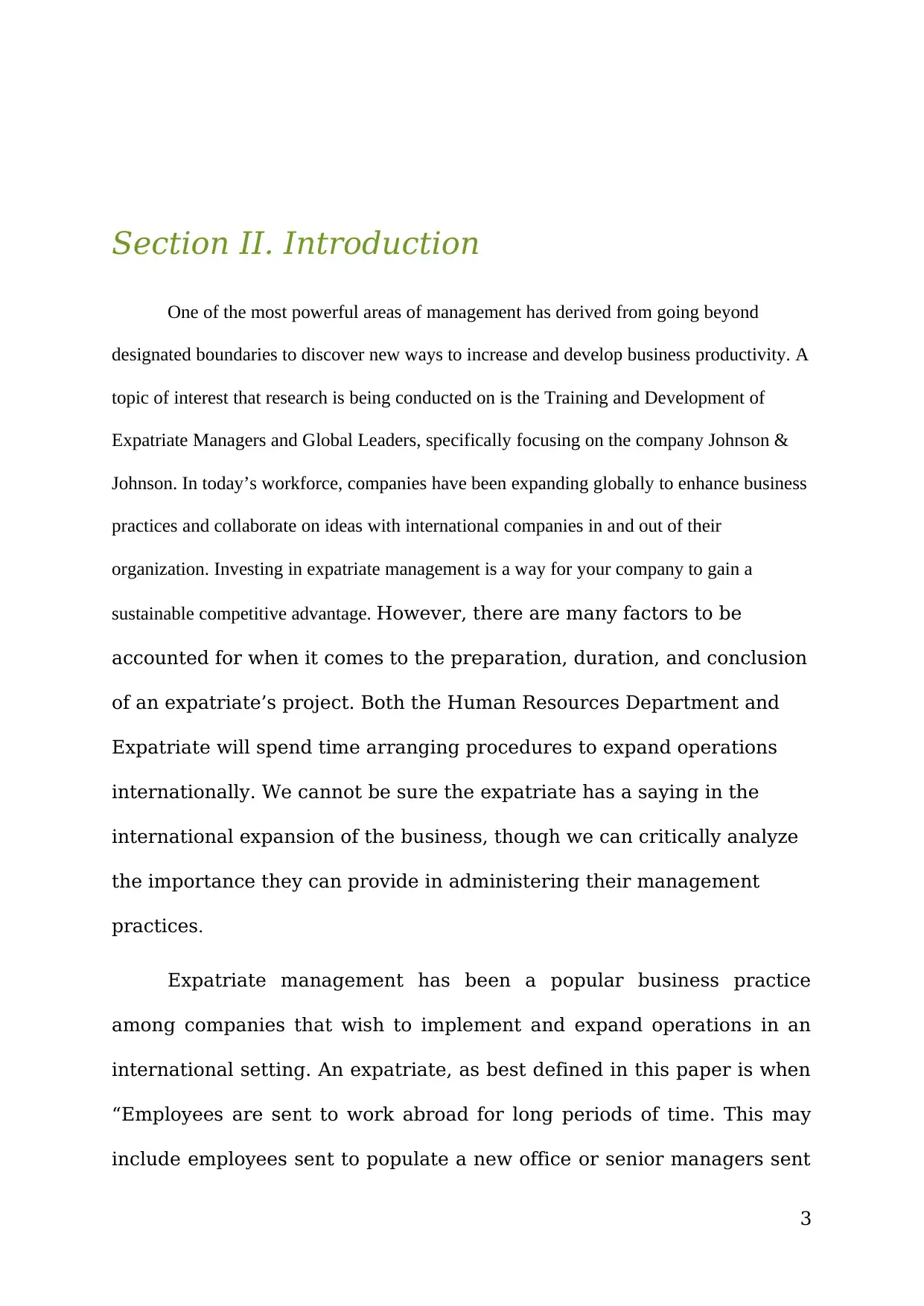
Section II. Introduction
One of the most powerful areas of management has derived from going beyond
designated boundaries to discover new ways to increase and develop business productivity. A
topic of interest that research is being conducted on is the Training and Development of
Expatriate Managers and Global Leaders, specifically focusing on the company Johnson &
Johnson. In today’s workforce, companies have been expanding globally to enhance business
practices and collaborate on ideas with international companies in and out of their
organization. Investing in expatriate management is a way for your company to gain a
sustainable competitive advantage. However, there are many factors to be
accounted for when it comes to the preparation, duration, and conclusion
of an expatriate’s project. Both the Human Resources Department and
Expatriate will spend time arranging procedures to expand operations
internationally. We cannot be sure the expatriate has a saying in the
international expansion of the business, though we can critically analyze
the importance they can provide in administering their management
practices.
Expatriate management has been a popular business practice
among companies that wish to implement and expand operations in an
international setting. An expatriate, as best defined in this paper is when
“Employees are sent to work abroad for long periods of time. This may
include employees sent to populate a new office or senior managers sent
3
One of the most powerful areas of management has derived from going beyond
designated boundaries to discover new ways to increase and develop business productivity. A
topic of interest that research is being conducted on is the Training and Development of
Expatriate Managers and Global Leaders, specifically focusing on the company Johnson &
Johnson. In today’s workforce, companies have been expanding globally to enhance business
practices and collaborate on ideas with international companies in and out of their
organization. Investing in expatriate management is a way for your company to gain a
sustainable competitive advantage. However, there are many factors to be
accounted for when it comes to the preparation, duration, and conclusion
of an expatriate’s project. Both the Human Resources Department and
Expatriate will spend time arranging procedures to expand operations
internationally. We cannot be sure the expatriate has a saying in the
international expansion of the business, though we can critically analyze
the importance they can provide in administering their management
practices.
Expatriate management has been a popular business practice
among companies that wish to implement and expand operations in an
international setting. An expatriate, as best defined in this paper is when
“Employees are sent to work abroad for long periods of time. This may
include employees sent to populate a new office or senior managers sent
3
Paraphrase This Document
Need a fresh take? Get an instant paraphrase of this document with our AI Paraphraser
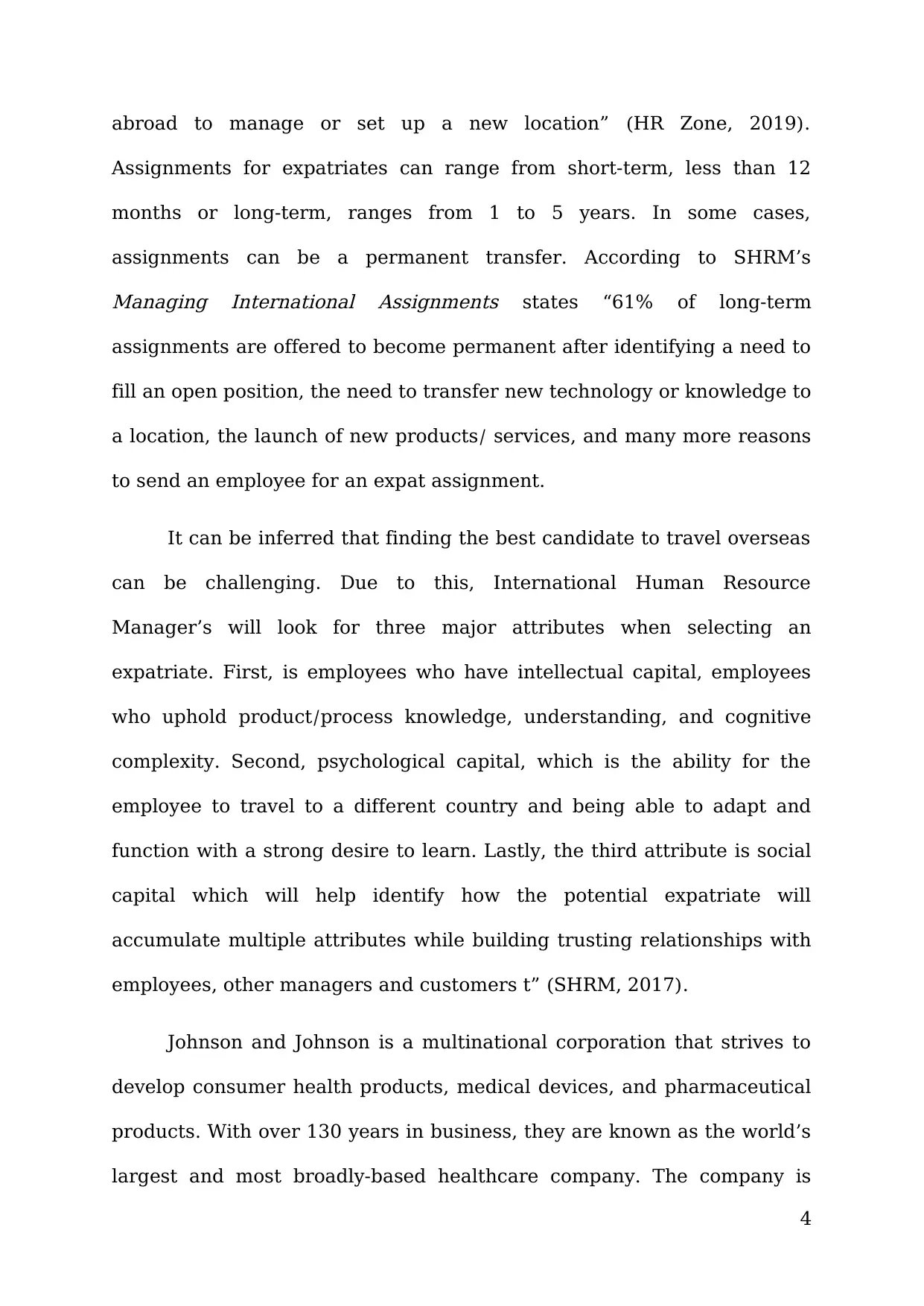
abroad to manage or set up a new location” (HR Zone, 2019).
Assignments for expatriates can range from short-term, less than 12
months or long-term, ranges from 1 to 5 years. In some cases,
assignments can be a permanent transfer. According to SHRM’s
Managing International Assignments states “61% of long-term
assignments are offered to become permanent after identifying a need to
fill an open position, the need to transfer new technology or knowledge to
a location, the launch of new products/ services, and many more reasons
to send an employee for an expat assignment.
It can be inferred that finding the best candidate to travel overseas
can be challenging. Due to this, International Human Resource
Manager’s will look for three major attributes when selecting an
expatriate. First, is employees who have intellectual capital, employees
who uphold product/process knowledge, understanding, and cognitive
complexity. Second, psychological capital, which is the ability for the
employee to travel to a different country and being able to adapt and
function with a strong desire to learn. Lastly, the third attribute is social
capital which will help identify how the potential expatriate will
accumulate multiple attributes while building trusting relationships with
employees, other managers and customers t” (SHRM, 2017).
Johnson and Johnson is a multinational corporation that strives to
develop consumer health products, medical devices, and pharmaceutical
products. With over 130 years in business, they are known as the world’s
largest and most broadly-based healthcare company. The company is
4
Assignments for expatriates can range from short-term, less than 12
months or long-term, ranges from 1 to 5 years. In some cases,
assignments can be a permanent transfer. According to SHRM’s
Managing International Assignments states “61% of long-term
assignments are offered to become permanent after identifying a need to
fill an open position, the need to transfer new technology or knowledge to
a location, the launch of new products/ services, and many more reasons
to send an employee for an expat assignment.
It can be inferred that finding the best candidate to travel overseas
can be challenging. Due to this, International Human Resource
Manager’s will look for three major attributes when selecting an
expatriate. First, is employees who have intellectual capital, employees
who uphold product/process knowledge, understanding, and cognitive
complexity. Second, psychological capital, which is the ability for the
employee to travel to a different country and being able to adapt and
function with a strong desire to learn. Lastly, the third attribute is social
capital which will help identify how the potential expatriate will
accumulate multiple attributes while building trusting relationships with
employees, other managers and customers t” (SHRM, 2017).
Johnson and Johnson is a multinational corporation that strives to
develop consumer health products, medical devices, and pharmaceutical
products. With over 130 years in business, they are known as the world’s
largest and most broadly-based healthcare company. The company is
4
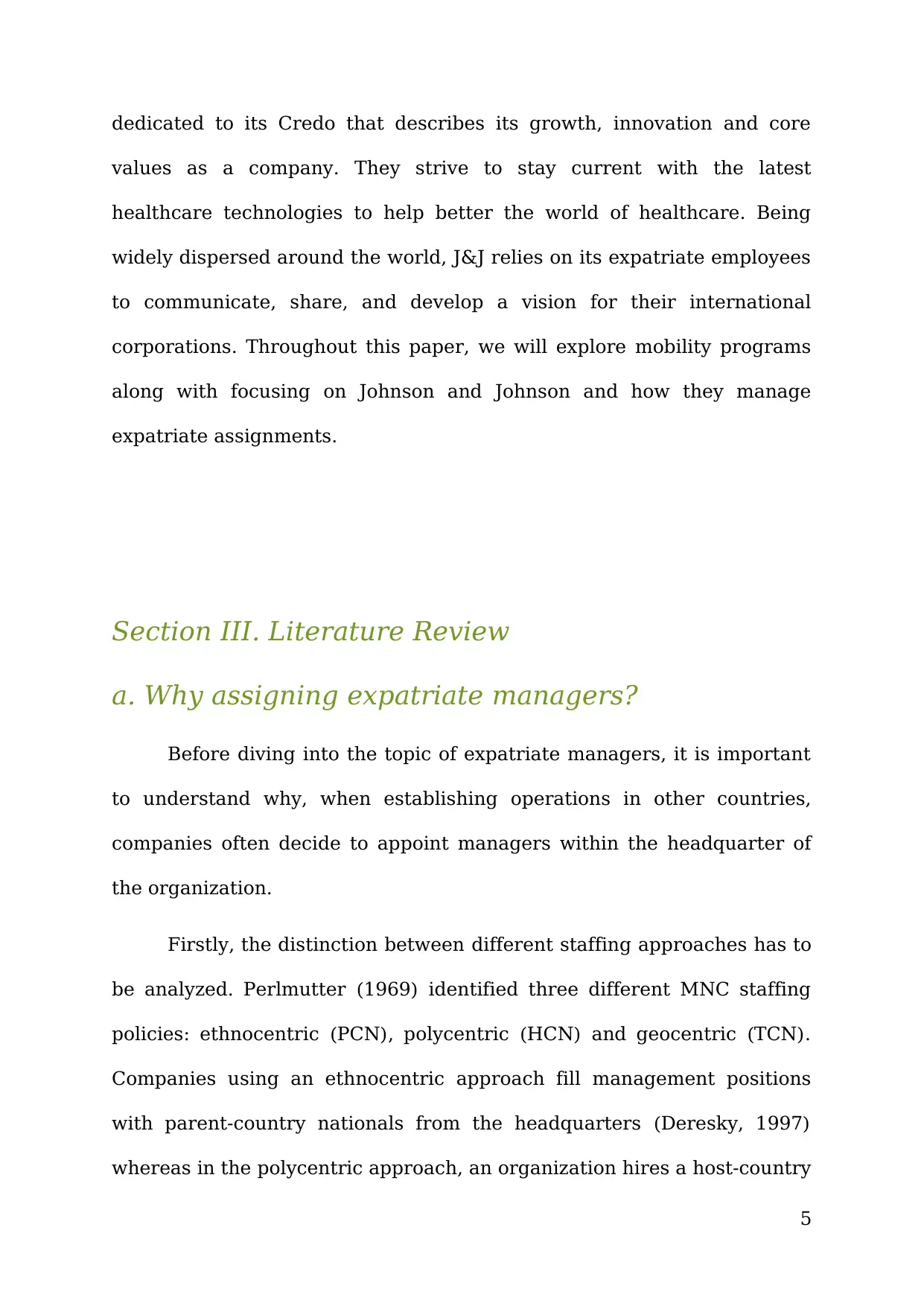
dedicated to its Credo that describes its growth, innovation and core
values as a company. They strive to stay current with the latest
healthcare technologies to help better the world of healthcare. Being
widely dispersed around the world, J&J relies on its expatriate employees
to communicate, share, and develop a vision for their international
corporations. Throughout this paper, we will explore mobility programs
along with focusing on Johnson and Johnson and how they manage
expatriate assignments.
Section III. Literature Review
a. Why assigning expatriate managers?
Before diving into the topic of expatriate managers, it is important
to understand why, when establishing operations in other countries,
companies often decide to appoint managers within the headquarter of
the organization.
Firstly, the distinction between different staffing approaches has to
be analyzed. Perlmutter (1969) identified three different MNC staffing
policies: ethnocentric (PCN), polycentric (HCN) and geocentric (TCN).
Companies using an ethnocentric approach fill management positions
with parent-country nationals from the headquarters (Deresky, 1997)
whereas in the polycentric approach, an organization hires a host-country
5
values as a company. They strive to stay current with the latest
healthcare technologies to help better the world of healthcare. Being
widely dispersed around the world, J&J relies on its expatriate employees
to communicate, share, and develop a vision for their international
corporations. Throughout this paper, we will explore mobility programs
along with focusing on Johnson and Johnson and how they manage
expatriate assignments.
Section III. Literature Review
a. Why assigning expatriate managers?
Before diving into the topic of expatriate managers, it is important
to understand why, when establishing operations in other countries,
companies often decide to appoint managers within the headquarter of
the organization.
Firstly, the distinction between different staffing approaches has to
be analyzed. Perlmutter (1969) identified three different MNC staffing
policies: ethnocentric (PCN), polycentric (HCN) and geocentric (TCN).
Companies using an ethnocentric approach fill management positions
with parent-country nationals from the headquarters (Deresky, 1997)
whereas in the polycentric approach, an organization hires a host-country
5
⊘ This is a preview!⊘
Do you want full access?
Subscribe today to unlock all pages.

Trusted by 1+ million students worldwide
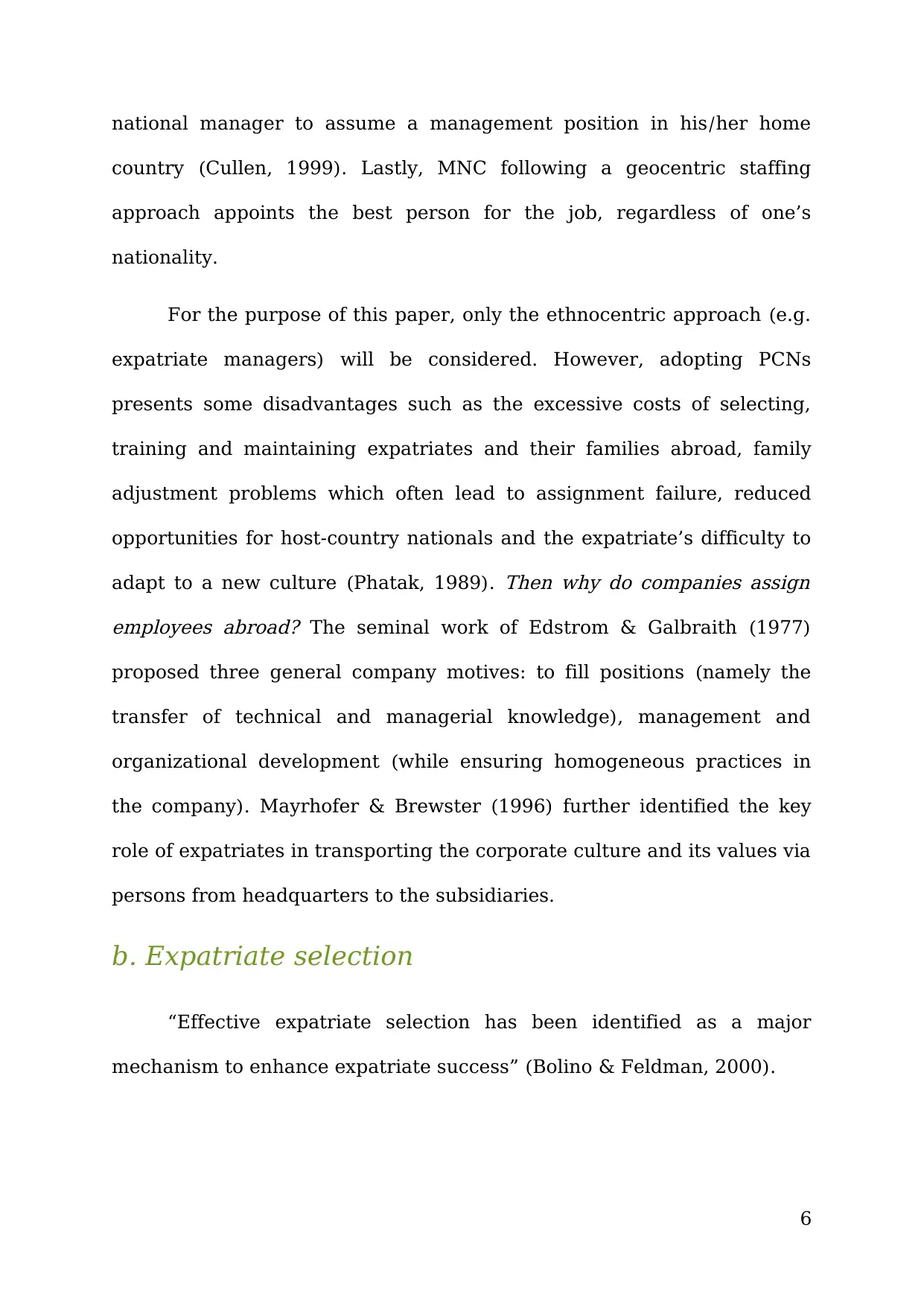
national manager to assume a management position in his/her home
country (Cullen, 1999). Lastly, MNC following a geocentric staffing
approach appoints the best person for the job, regardless of one’s
nationality.
For the purpose of this paper, only the ethnocentric approach (e.g.
expatriate managers) will be considered. However, adopting PCNs
presents some disadvantages such as the excessive costs of selecting,
training and maintaining expatriates and their families abroad, family
adjustment problems which often lead to assignment failure, reduced
opportunities for host-country nationals and the expatriate’s difficulty to
adapt to a new culture (Phatak, 1989).
Then why do companies assign
employees abroad? The seminal work of Edstrom & Galbraith (1977)
proposed three general company motives: to fill positions (namely the
transfer of technical and managerial knowledge), management and
organizational development (while ensuring homogeneous practices in
the company). Mayrhofer & Brewster (1996) further identified the key
role of expatriates in transporting the corporate culture and its values via
persons from headquarters to the subsidiaries.
b. Expatriate selection
“Effective expatriate selection has been identified as a major
mechanism to enhance expatriate success” (Bolino & Feldman, 2000).
6
country (Cullen, 1999). Lastly, MNC following a geocentric staffing
approach appoints the best person for the job, regardless of one’s
nationality.
For the purpose of this paper, only the ethnocentric approach (e.g.
expatriate managers) will be considered. However, adopting PCNs
presents some disadvantages such as the excessive costs of selecting,
training and maintaining expatriates and their families abroad, family
adjustment problems which often lead to assignment failure, reduced
opportunities for host-country nationals and the expatriate’s difficulty to
adapt to a new culture (Phatak, 1989).
Then why do companies assign
employees abroad? The seminal work of Edstrom & Galbraith (1977)
proposed three general company motives: to fill positions (namely the
transfer of technical and managerial knowledge), management and
organizational development (while ensuring homogeneous practices in
the company). Mayrhofer & Brewster (1996) further identified the key
role of expatriates in transporting the corporate culture and its values via
persons from headquarters to the subsidiaries.
b. Expatriate selection
“Effective expatriate selection has been identified as a major
mechanism to enhance expatriate success” (Bolino & Feldman, 2000).
6
Paraphrase This Document
Need a fresh take? Get an instant paraphrase of this document with our AI Paraphraser
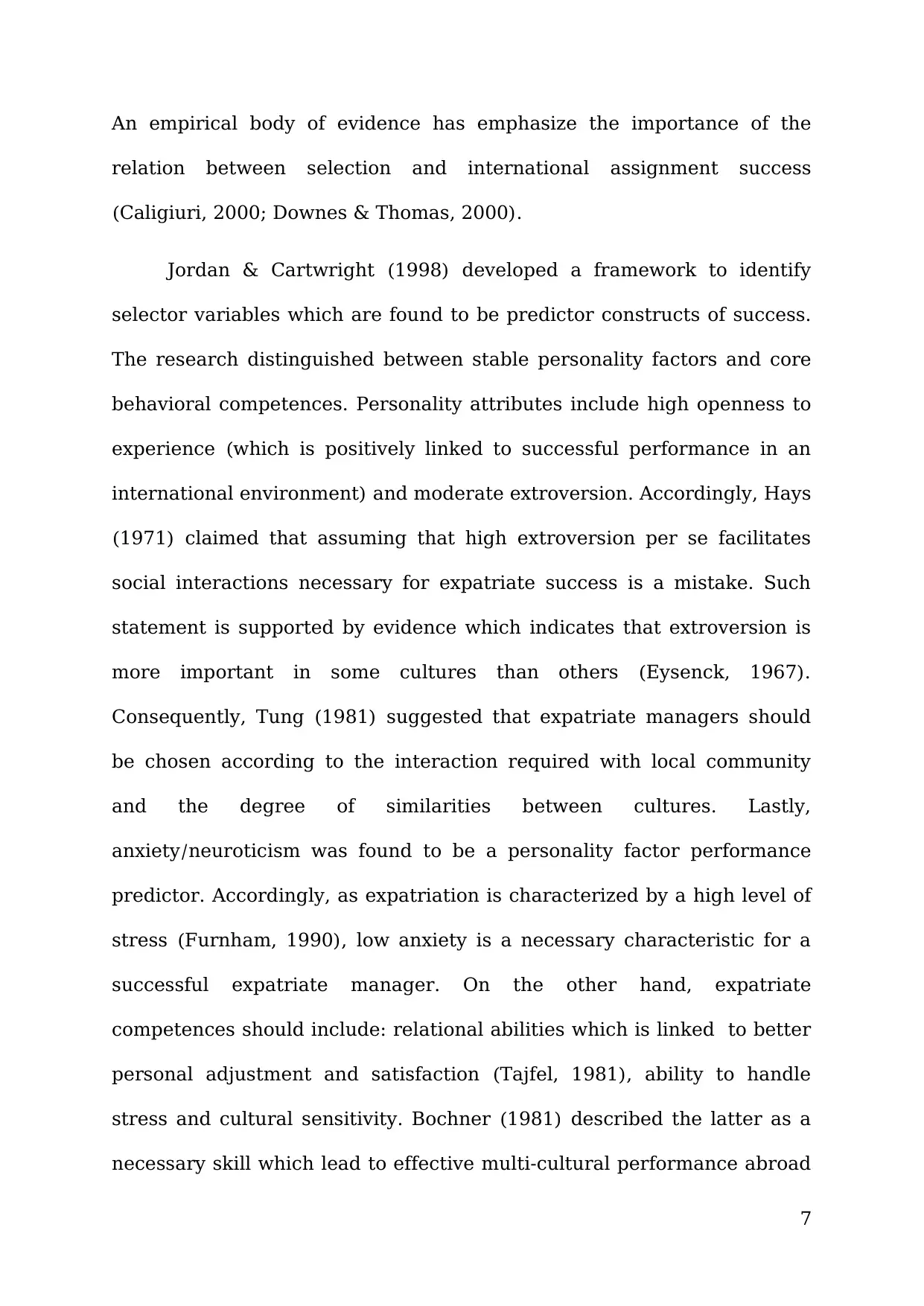
An empirical body of evidence has emphasize the importance of the
relation between selection and international assignment success
(Caligiuri, 2000; Downes & Thomas, 2000).
Jordan & Cartwright (1998) developed a framework to identify
selector variables which are found to be predictor constructs of success.
The research distinguished between stable personality factors and core
behavioral competences. Personality attributes include high openness to
experience (which is positively linked to successful performance in an
international environment) and moderate extroversion. Accordingly, Hays
(1971) claimed that assuming that high extroversion per se facilitates
social interactions necessary for expatriate success is a mistake. Such
statement is supported by evidence which indicates that extroversion is
more important in some cultures than others (Eysenck, 1967).
Consequently, Tung (1981) suggested that expatriate managers should
be chosen according to the interaction required with local community
and the degree of similarities between cultures. Lastly,
anxiety/neuroticism was found to be a personality factor performance
predictor. Accordingly, as expatriation is characterized by a high level of
stress (Furnham, 1990), low anxiety is a necessary characteristic for a
successful expatriate manager. On the other hand, expatriate
competences should include: relational abilities which is linked to better
personal adjustment and satisfaction (Tajfel, 1981), ability to handle
stress and cultural sensitivity. Bochner (1981) described the latter as a
necessary skill which lead to effective multi-cultural performance abroad
7
relation between selection and international assignment success
(Caligiuri, 2000; Downes & Thomas, 2000).
Jordan & Cartwright (1998) developed a framework to identify
selector variables which are found to be predictor constructs of success.
The research distinguished between stable personality factors and core
behavioral competences. Personality attributes include high openness to
experience (which is positively linked to successful performance in an
international environment) and moderate extroversion. Accordingly, Hays
(1971) claimed that assuming that high extroversion per se facilitates
social interactions necessary for expatriate success is a mistake. Such
statement is supported by evidence which indicates that extroversion is
more important in some cultures than others (Eysenck, 1967).
Consequently, Tung (1981) suggested that expatriate managers should
be chosen according to the interaction required with local community
and the degree of similarities between cultures. Lastly,
anxiety/neuroticism was found to be a personality factor performance
predictor. Accordingly, as expatriation is characterized by a high level of
stress (Furnham, 1990), low anxiety is a necessary characteristic for a
successful expatriate manager. On the other hand, expatriate
competences should include: relational abilities which is linked to better
personal adjustment and satisfaction (Tajfel, 1981), ability to handle
stress and cultural sensitivity. Bochner (1981) described the latter as a
necessary skill which lead to effective multi-cultural performance abroad
7
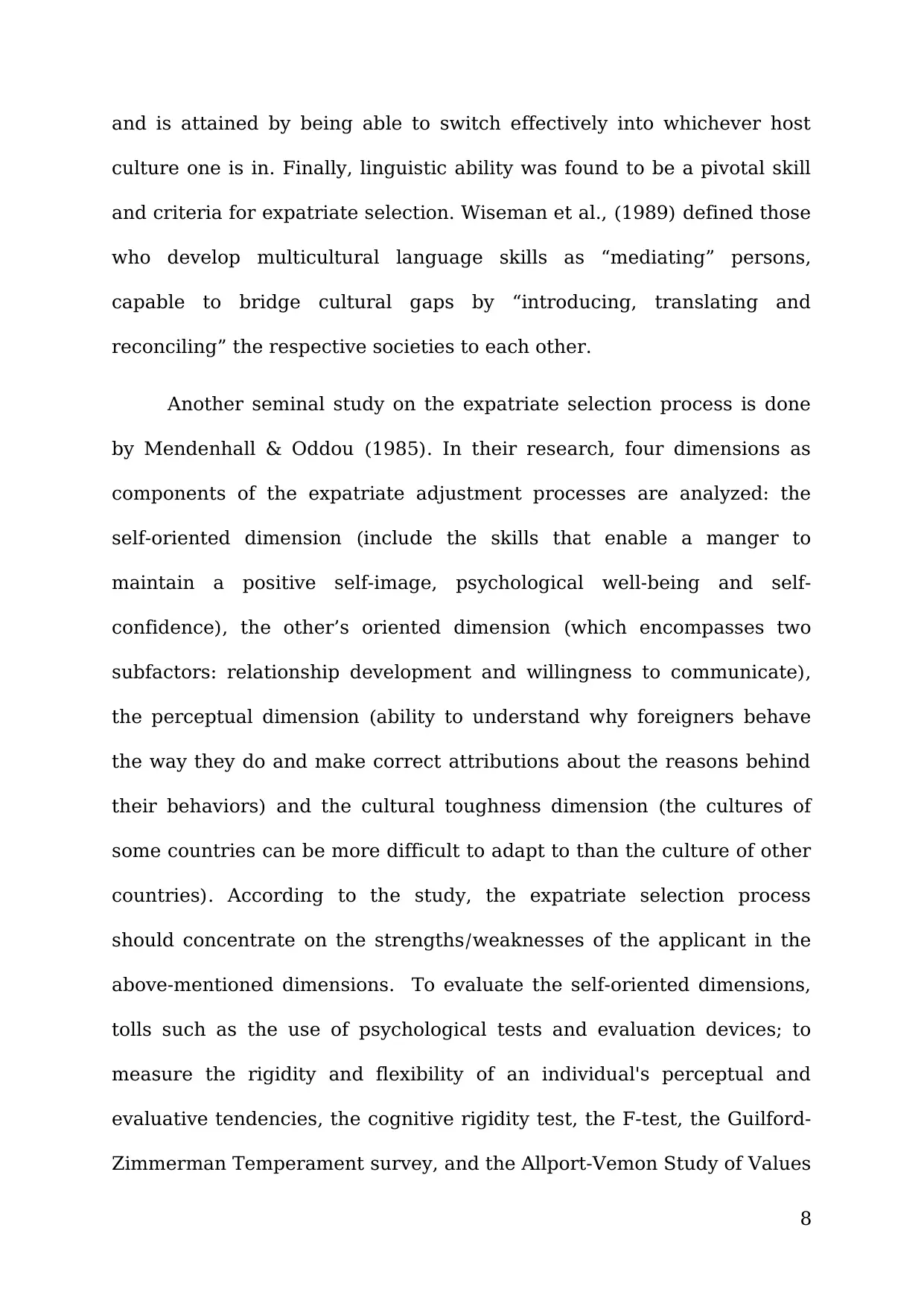
and is attained by being able to switch effectively into whichever host
culture one is in. Finally, linguistic ability was found to be a pivotal skill
and criteria for expatriate selection. Wiseman et al., (1989) defined those
who develop multicultural language skills as “mediating” persons,
capable to bridge cultural gaps by “introducing, translating and
reconciling” the respective societies to each other.
Another seminal study on the expatriate selection process is done
by Mendenhall & Oddou (1985). In their research, four dimensions as
components of the expatriate adjustment processes are analyzed: the
self-oriented dimension (include the skills that enable a manger to
maintain a positive self-image, psychological well-being and self-
confidence), the other’s oriented dimension (which encompasses two
subfactors: relationship development and willingness to communicate),
the perceptual dimension (ability to understand why foreigners behave
the way they do and make correct attributions about the reasons behind
their behaviors) and the cultural toughness dimension (the cultures of
some countries can be more difficult to adapt to than the culture of other
countries). According to the study, the expatriate selection process
should concentrate on the strengths/weaknesses of the applicant in the
above-mentioned dimensions. To evaluate the self-oriented dimensions,
tolls such as the use of psychological tests and evaluation devices; to
measure the rigidity and flexibility of an individual's perceptual and
evaluative tendencies, the cognitive rigidity test, the F-test, the Guilford-
Zimmerman Temperament survey, and the Allport-Vemon Study of Values
8
culture one is in. Finally, linguistic ability was found to be a pivotal skill
and criteria for expatriate selection. Wiseman et al., (1989) defined those
who develop multicultural language skills as “mediating” persons,
capable to bridge cultural gaps by “introducing, translating and
reconciling” the respective societies to each other.
Another seminal study on the expatriate selection process is done
by Mendenhall & Oddou (1985). In their research, four dimensions as
components of the expatriate adjustment processes are analyzed: the
self-oriented dimension (include the skills that enable a manger to
maintain a positive self-image, psychological well-being and self-
confidence), the other’s oriented dimension (which encompasses two
subfactors: relationship development and willingness to communicate),
the perceptual dimension (ability to understand why foreigners behave
the way they do and make correct attributions about the reasons behind
their behaviors) and the cultural toughness dimension (the cultures of
some countries can be more difficult to adapt to than the culture of other
countries). According to the study, the expatriate selection process
should concentrate on the strengths/weaknesses of the applicant in the
above-mentioned dimensions. To evaluate the self-oriented dimensions,
tolls such as the use of psychological tests and evaluation devices; to
measure the rigidity and flexibility of an individual's perceptual and
evaluative tendencies, the cognitive rigidity test, the F-test, the Guilford-
Zimmerman Temperament survey, and the Allport-Vemon Study of Values
8
⊘ This is a preview!⊘
Do you want full access?
Subscribe today to unlock all pages.

Trusted by 1+ million students worldwide
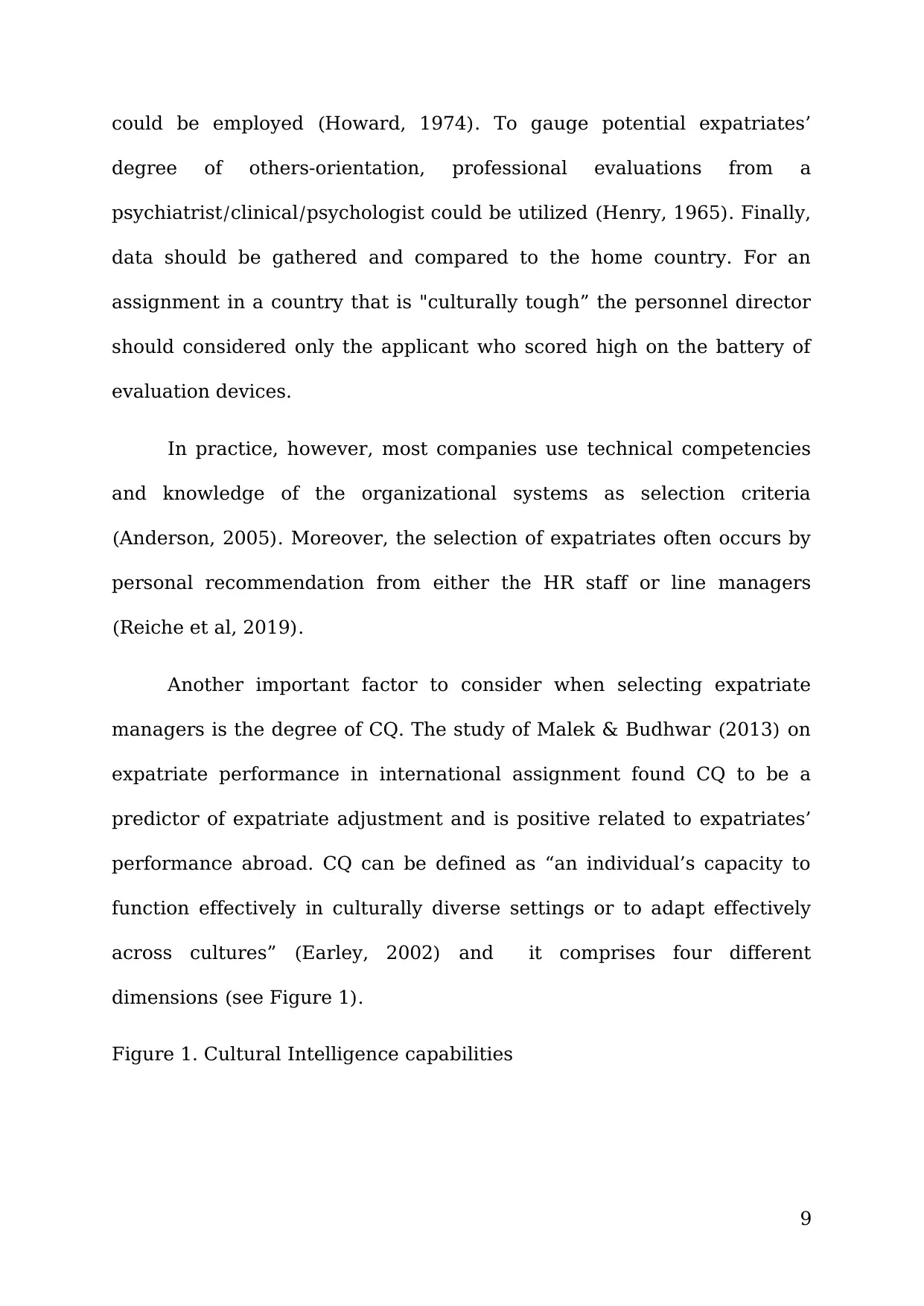
could be employed (Howard, 1974). To gauge potential expatriates’
degree of others-orientation, professional evaluations from a
psychiatrist/clinical/psychologist could be utilized (Henry, 1965). Finally,
data should be gathered and compared to the home country. For an
assignment in a country that is "culturally tough” the personnel director
should considered only the applicant who scored high on the battery of
evaluation devices.
In practice, however, most companies use technical competencies
and knowledge of the organizational systems as selection criteria
(Anderson, 2005). Moreover, the selection of expatriates often occurs by
personal recommendation from either the HR staff or line managers
(Reiche et al, 2019).
Another important factor to consider when selecting expatriate
managers is the degree of CQ. The study of Malek & Budhwar (2013) on
expatriate performance in international assignment found CQ to be a
predictor of expatriate adjustment and is positive related to expatriates’
performance abroad. CQ can be defined as “an individual’s capacity to
function effectively in culturally diverse settings or to adapt effectively
across cultures” (Earley, 2002) and it comprises four different
dimensions (see Figure 1).
Figure 1. Cultural Intelligence capabilities
9
degree of others-orientation, professional evaluations from a
psychiatrist/clinical/psychologist could be utilized (Henry, 1965). Finally,
data should be gathered and compared to the home country. For an
assignment in a country that is "culturally tough” the personnel director
should considered only the applicant who scored high on the battery of
evaluation devices.
In practice, however, most companies use technical competencies
and knowledge of the organizational systems as selection criteria
(Anderson, 2005). Moreover, the selection of expatriates often occurs by
personal recommendation from either the HR staff or line managers
(Reiche et al, 2019).
Another important factor to consider when selecting expatriate
managers is the degree of CQ. The study of Malek & Budhwar (2013) on
expatriate performance in international assignment found CQ to be a
predictor of expatriate adjustment and is positive related to expatriates’
performance abroad. CQ can be defined as “an individual’s capacity to
function effectively in culturally diverse settings or to adapt effectively
across cultures” (Earley, 2002) and it comprises four different
dimensions (see Figure 1).
Figure 1. Cultural Intelligence capabilities
9
Paraphrase This Document
Need a fresh take? Get an instant paraphrase of this document with our AI Paraphraser
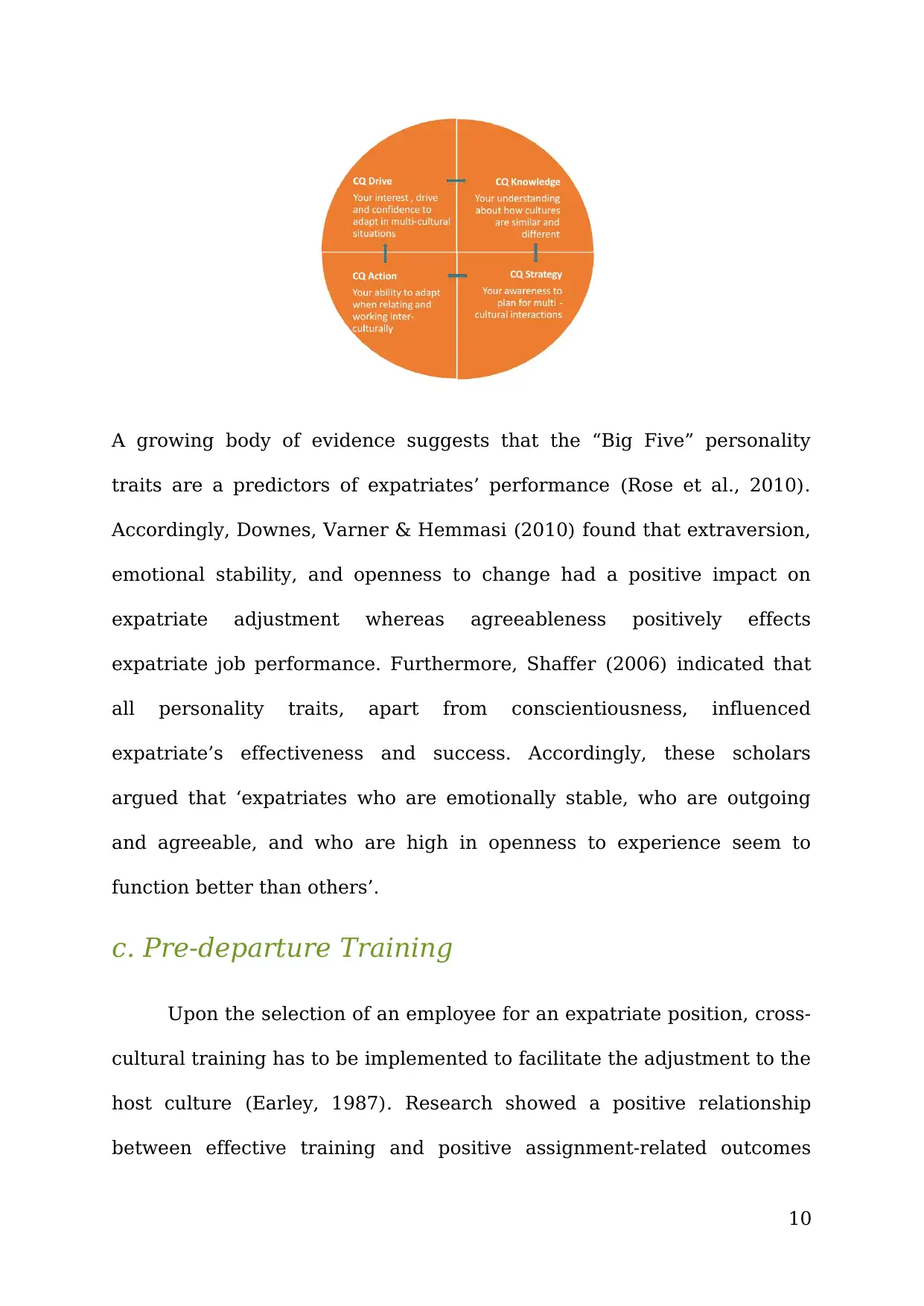
A growing body of evidence suggests that the “Big Five” personality
traits are a predictors of expatriates’ performance (Rose et al., 2010).
Accordingly, Downes, Varner & Hemmasi (2010) found that extraversion,
emotional stability, and openness to change had a positive impact on
expatriate adjustment whereas agreeableness positively effects
expatriate job performance. Furthermore, Shaffer (2006) indicated that
all personality traits, apart from conscientiousness, influenced
expatriate’s effectiveness and success. Accordingly, these scholars
argued that ‘expatriates who are emotionally stable, who are outgoing
and agreeable, and who are high in openness to experience seem to
function better than others’.
c. Pre-departure Training
Upon the selection of an employee for an expatriate position, cross-
cultural training has to be implemented to facilitate the adjustment to the
host culture (Earley, 1987). Research showed a positive relationship
between effective training and positive assignment-related outcomes
10
traits are a predictors of expatriates’ performance (Rose et al., 2010).
Accordingly, Downes, Varner & Hemmasi (2010) found that extraversion,
emotional stability, and openness to change had a positive impact on
expatriate adjustment whereas agreeableness positively effects
expatriate job performance. Furthermore, Shaffer (2006) indicated that
all personality traits, apart from conscientiousness, influenced
expatriate’s effectiveness and success. Accordingly, these scholars
argued that ‘expatriates who are emotionally stable, who are outgoing
and agreeable, and who are high in openness to experience seem to
function better than others’.
c. Pre-departure Training
Upon the selection of an employee for an expatriate position, cross-
cultural training has to be implemented to facilitate the adjustment to the
host culture (Earley, 1987). Research showed a positive relationship
between effective training and positive assignment-related outcomes
10
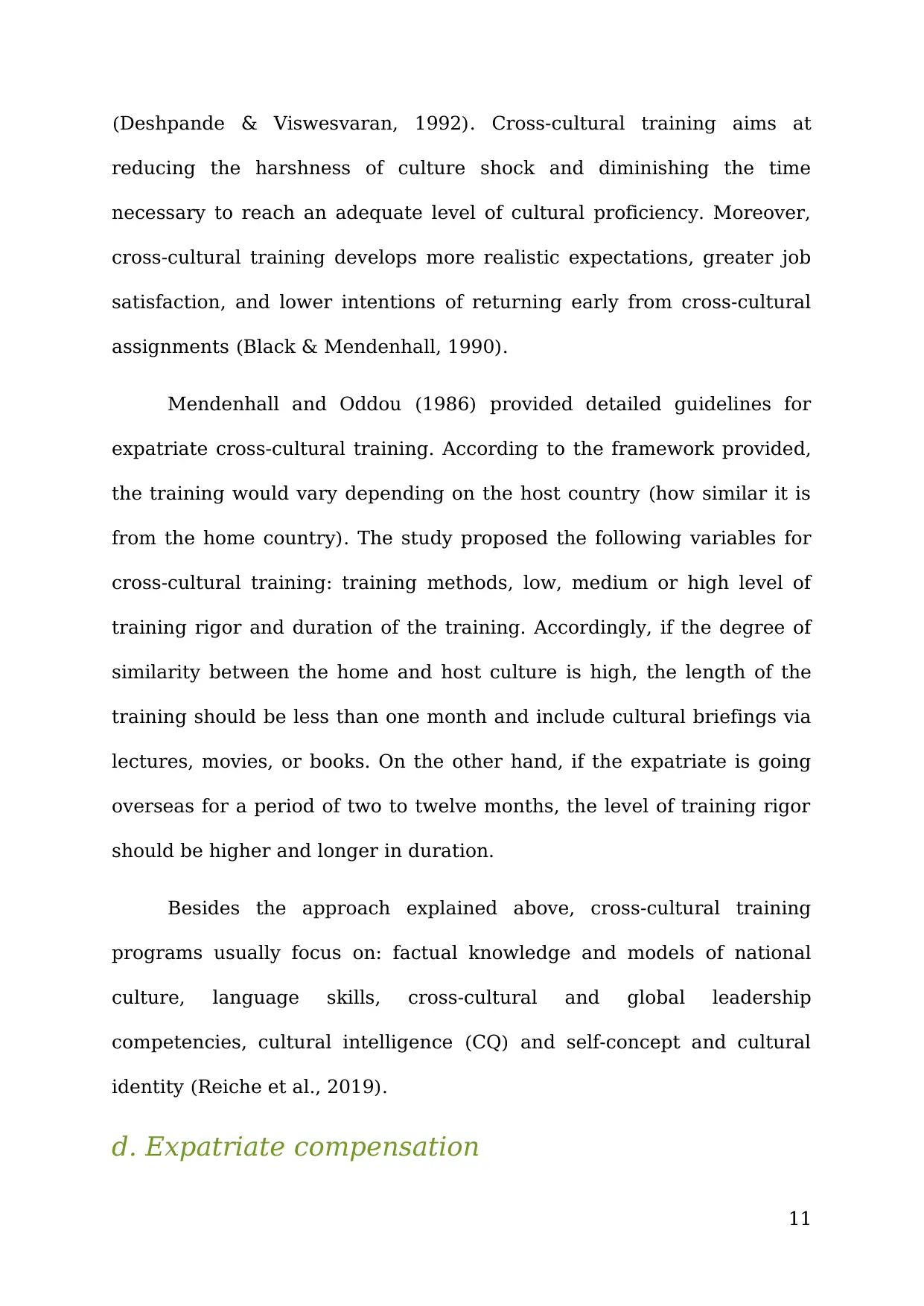
(Deshpande & Viswesvaran, 1992). Cross-cultural training aims at
reducing the harshness of culture shock and diminishing the time
necessary to reach an adequate level of cultural proficiency. Moreover,
cross-cultural training develops more realistic expectations, greater job
satisfaction, and lower intentions of returning early from cross-cultural
assignments (Black & Mendenhall, 1990).
Mendenhall and Oddou (1986) provided detailed guidelines for
expatriate cross-cultural training. According to the framework provided,
the training would vary depending on the host country (how similar it is
from the home country). The study proposed the following variables for
cross-cultural training: training methods, low, medium or high level of
training rigor and duration of the training. Accordingly, if the degree of
similarity between the home and host culture is high, the length of the
training should be less than one month and include cultural briefings via
lectures, movies, or books. On the other hand, if the expatriate is going
overseas for a period of two to twelve months, the level of training rigor
should be higher and longer in duration.
Besides the approach explained above, cross-cultural training
programs usually focus on: factual knowledge and models of national
culture, language skills, cross-cultural and global leadership
competencies, cultural intelligence (CQ) and self-concept and cultural
identity (Reiche et al., 2019).
d. Expatriate compensation
11
reducing the harshness of culture shock and diminishing the time
necessary to reach an adequate level of cultural proficiency. Moreover,
cross-cultural training develops more realistic expectations, greater job
satisfaction, and lower intentions of returning early from cross-cultural
assignments (Black & Mendenhall, 1990).
Mendenhall and Oddou (1986) provided detailed guidelines for
expatriate cross-cultural training. According to the framework provided,
the training would vary depending on the host country (how similar it is
from the home country). The study proposed the following variables for
cross-cultural training: training methods, low, medium or high level of
training rigor and duration of the training. Accordingly, if the degree of
similarity between the home and host culture is high, the length of the
training should be less than one month and include cultural briefings via
lectures, movies, or books. On the other hand, if the expatriate is going
overseas for a period of two to twelve months, the level of training rigor
should be higher and longer in duration.
Besides the approach explained above, cross-cultural training
programs usually focus on: factual knowledge and models of national
culture, language skills, cross-cultural and global leadership
competencies, cultural intelligence (CQ) and self-concept and cultural
identity (Reiche et al., 2019).
d. Expatriate compensation
11
⊘ This is a preview!⊘
Do you want full access?
Subscribe today to unlock all pages.

Trusted by 1+ million students worldwide
1 out of 31
Your All-in-One AI-Powered Toolkit for Academic Success.
+13062052269
info@desklib.com
Available 24*7 on WhatsApp / Email
![[object Object]](/_next/static/media/star-bottom.7253800d.svg)
Unlock your academic potential
Copyright © 2020–2026 A2Z Services. All Rights Reserved. Developed and managed by ZUCOL.